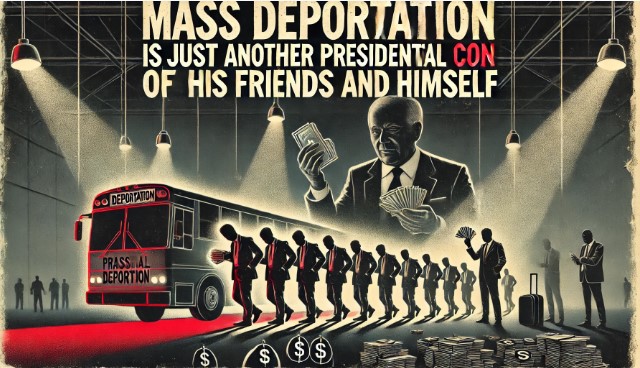There may be more to Trump’s mass deportation. He may use it to line his pockets and those of his friends with private detention camps and extortion to farmers.
Mass deportation: Trump’s con
Podcasts (Video — Audio)
Summary
The video highlights the economic and moral ramifications of Donald Trump’s proposed mass deportation policies. It argues that these measures would devastate industries like agriculture, which heavily rely on immigrant labor, leading to economic disruptions and inflated prices. The speaker speculates that Trump might use deportations as a public show while secretly taking bribes to shield industries from labor shortages. They criticize the private detention center industry for exploiting immigrants for profit and highlight the hypocrisy of evangelical Christians supporting anti-immigrant policies contrary to biblical teachings. Ultimately, the speaker calls for awareness of these manipulative tactics and stresses the need for progressive solutions prioritizing justice and fairness.
Bullet Points
- Economic Disruption: Deportations would cripple industries like agriculture and construction, which rely on immigrant labor, leading to food shortages and higher prices.
- Corruption Risks: Trump is accused of potentially taking bribes from industries to exempt workers from deportation while maintaining a public facade of enforcement.
- Profit-Driven Detention Centers: Private detention facilities are highlighted as exploitative, prioritizing profits over the humane treatment of immigrants.
- Moral Hypocrisy: Evangelical Christian support for anti-immigrant policies is criticized as contradictory to biblical teachings of compassion.
- Call for Progressive Solutions: The speaker advocates for immigration policies recognizing immigrants’ contributions and upholding human dignity.
Donald Trump’s deportation agenda serves as a smokescreen for policies designed to exploit immigrants and enrich the powerful. By destabilizing industries, enriching private detention centers, and perpetuating systemic inequality, this plan reflects the worst of crony capitalism. A progressive approach is essential, focusing on compassion, economic equity, and recognizing the invaluable contributions of immigrant communities to the nation.


